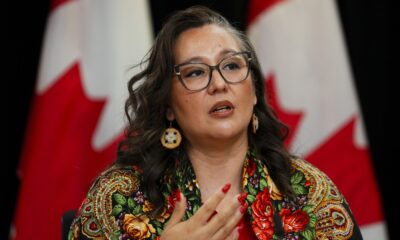Top Stories
B.C. Fast-Tracks Mining Projects Amid Global Demand Surge

UPDATE: British Columbia (B.C.) has officially launched an urgent initiative to fast-track mining projects, responding to soaring global demand for critical minerals. As of March 2025, the provincial government aims to expedite reviews and streamline processes for 18 mining and energy projects, including four key mining operations essential for the clean energy transition.
This development comes amidst fierce competition with China and the pressing need for materials like copper, nickel, and rare earth elements vital for electric vehicle batteries, solar panels, and wind turbines. However, significant concerns linger regarding the balance between rapid development and the protection of Indigenous rights and environmental standards.
Dr. John Steen, director of the UBC Bradshaw Research Institute for Minerals and Mining, emphasized that fast-tracking means allocating more resources to expedite reviews while maintaining legal compliance. “The biggest challenge remains obtaining Indigenous rights-holders’ consent,” Steen stated.
Dr. Carol Liao, UBC Sauder Distinguished Fellow, noted that the expedited process could risk environmental integrity and constitutional consultation obligations. “If done poorly, fast-tracking can lead to significant risks, including insufficient baseline data and potential court challenges,” she warned.
The urgency of these projects is underscored by the involvement of the Tahltan Nation in the accelerated Eskay Creek and Red Chris projects, demonstrating a model for collaboration. “These projects show that fast-tracking can work with Indigenous leadership and benefit sharing,” Steen explained.
However, both experts cautioned that acceleration should not bypass constitutional obligations under Section 35. Liao highlighted that many current fast-tracking efforts are rooted in outdated legal frameworks that do not align with the United Nations Declaration on the Rights of Indigenous Peoples (UNDRIP), which B.C. has committed to uphold.
As B.C. seeks to position itself as a leader in the critical minerals sector, there are calls for a more ambitious strategy that extends beyond mere resource extraction. “B.C. is a global mining technology center, with companies like Minesense and Motion Metrics leading the way in operational efficiency and environmental impact reduction,” Steen noted.
Recent legal challenges have also surfaced, with the B.C. Supreme Court ruling in 2023 that the Mineral Tenure Act inadequately addressed First Nations rights and title. The court granted the government 18 months to reform the process, yet critics argue that current measures still perpetuate colonial decision-making.
What’s next for B.C.? Experts agree that balancing consultation, regulatory review, and mineral production will be crucial. Liao urged a fundamental shift: “We must rethink who defines critical projects and sets timelines. A consent-based nation-to-nation model is essential for creating a sustainable critical minerals sector.”
As B.C. navigates this pivotal moment, the eyes of the world are watching. This urgent initiative not only affects local communities and Indigenous rights but also positions B.C. at the forefront of the global clean energy movement. The decisions made today will resonate far into the future.
Stay tuned for more updates as this story develops.
-

 Politics4 weeks ago
Politics4 weeks agoSecwepemc First Nation Seeks Aboriginal Title Over Kamloops Area
-

 World5 months ago
World5 months agoScientists Unearth Ancient Antarctic Ice to Unlock Climate Secrets
-

 Entertainment5 months ago
Entertainment5 months agoTrump and McCormick to Announce $70 Billion Energy Investments
-

 Science5 months ago
Science5 months agoFour Astronauts Return to Earth After International Space Station Mission
-

 Lifestyle5 months ago
Lifestyle5 months agoTransLink Launches Food Truck Program to Boost Revenue in Vancouver
-

 Technology3 months ago
Technology3 months agoApple Notes Enhances Functionality with Markdown Support in macOS 26
-

 Lifestyle3 months ago
Lifestyle3 months agoManitoba’s Burger Champion Shines Again Amid Dining Innovations
-

 Top Stories2 months ago
Top Stories2 months agoUrgent Update: Fatal Crash on Highway 99 Claims Life of Pitt Meadows Man
-

 Politics4 months ago
Politics4 months agoUkrainian Tennis Star Elina Svitolina Faces Death Threats Online
-

 Sports5 months ago
Sports5 months agoSearch Underway for Missing Hunter Amid Hokkaido Bear Emergency
-

 Politics5 months ago
Politics5 months agoCarney Engages First Nations Leaders at Development Law Summit
-

 Technology5 months ago
Technology5 months agoFrosthaven Launches Early Access on July 31, 2025





















